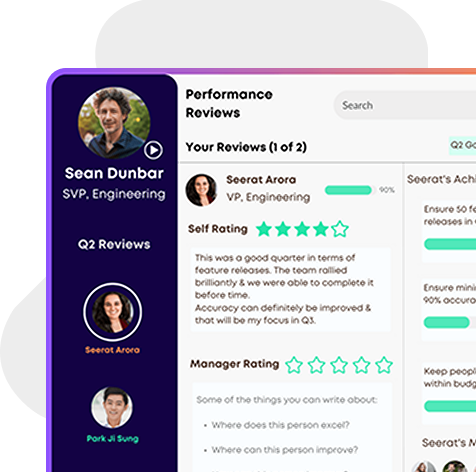

60 Sales Manager Goals and SMART Examples for Every Stage

Overview
Goal-setting keeps sales managers focused, improves performance, and drives measurable outcomes. For maximum impact, goals should be specific, achievable, and aligned with business objectives. Common short- and long-term goals for sales managers include:
- Learning new software before rollout
- Earning a promotion
- Contributing more to team performance
- Increasing sales by X%
- Building more potential client connections
Introduction
Sales managers today do more than close deals—they coach, strategize, and drive team performance. Setting clear, measurable goals is key to aligning their efforts with company revenue and growth.
In this blog, you’ll find 50+ sales manager goals across areas like revenue, team building, onboarding, and more.
Why Sales Manager Goals Need to Evolve
As times are changing, so are the sales manager goals. In the traditional sales domain, the key was to close x number of deals by the end of the week, month or year. However, that rule is not valid in today’s landscape. Micromanagement was at its peak with such strategies, hence, deteriorating the productivity and engagement of team members. Sales were initially more customer-centric than team-centric, creating a lot of pressure and exhaustion on the employees. With changing times, the goals of a sales manager should focus on:
Outcomes and behaviors: Sales manager goals earlier were focused on numbers. However, the goals of a sales manager should also prioritize nurturing the team and their behavior. Sales manager can educate their team on the products or services and how they can improve their communication skills, as a big part of sales is effective communication.
Leading indicators and lagging metrics: With the right sales manager goals, the person in charge can track leading indicators and lagging metrics. It is essential to track both. Hence, ensuring that the team is doing everything right.
Short-term targets and long-term growth: Effective sales manager goals should focus on both short-term and long-term targets. A short-term goals could be improving the number of leads that would convert to qualified possibilities. Long-term goals for a sales manager would include the aim to increase the total revenue of an organization by x%. Furthermore, it can retain the best sales employees so that they can contribute to the increase of sales in y years.
At the end of the day, sales manager goals should align team execution with business strategy. For that, you can use KPIs to track the goals and see how your team and employees are meeting them. How to Set Effective Goals as a Sales Manager
#1 Use the SMART framework:
Setting sales manager goals is important to keep the organization running smoothly. The first key to creating effective goals is implementing the SMART framework.
- Specific: The sales manager's smart goals begin with specific goals. It’s easier to say to increase sales than actually do it if there’s a lack of clarity. Ensure that the goals are clear to the team.
- Measurable: Instead of using subjectivity, you can set benchmarks to keep track of your team’s sales progress. Examples of smart goals for a sales manager would be using KPIs to see how the team is performing and if they are meeting individual targets.
- Achievable: It is good to be ambitious when it comes to meeting sales manager goals, but the goals should also be achievable. You cannot create goals for your team that are far beyond their reach. Check the past sales record of the team and set targets accordingly.
- Relevant: While setting sales manager goals, there are a few things to keep in mind. Whether the goals align with the representative goals currently. Whether the goals align with the company’s goals. How will the results create an effect in the organization? Say, if a sales rep totally meets his/her subscription renewal target for the existing account, they might get a bonus or a promotion, thus impacting individual goals.
- Time-bound: Setting a time and date in sales manager goals is crucial. If you make the goals time-bound, your team can plan how to proceed with the work accordingly and close the sale within the deadline. Managers should set weekly and monthly goals for reps. This will ensure they are focused, and it will build confidence in them to close the sales on time.
Also read: How to Set Goals at Work That Helps Measure Success - Guide
#2 Align personal goals with company goals:
When setting sales manager goals, it is important to align personal goals with company goals. For instance, the team has closed more than 50% of onboarding calls than the last record. This allowed the company to increase its revenue by 10%.
#3 Use quarterly or monthly check-ins, not just annual reviews
Annual reviews are outdated in the current sales domain. You can create successful sales manager goals by introducing quarterly or monthly check-ins. Review their work often and see who is meeting their goals and who is not. Understand the obstacles and find reasonable solutions.
{{cta-1}}
Revenue-Focused Goals for Sales Managers
Setting sales manager objective goals is very important. If you set objective goals, the reps and entire team will be focused and meet their targets aligned with company goals. Focused goals for managers include pipeline generation, closing ratio, and customer retention. Examples of sales manager goals and objectives are as follows:
Examples:
- Increase average deal size by 15% in Q3
- Achieve 120% of the quarterly sales target across all reps
- Improve win rate from 22% to 30% by the end of the year
- Launch a new pipeline hygiene review process to reduce aging deals by 25%
- Close 5 key enterprise deals worth over $100K each
- Improve lead-to-opportunity conversion by 20%
- Increase sales-qualified leads from marketing by 30%
- Reduce sales cycle length from 45 to 30 days
- Upsell to 25% of the existing customer base in Q2
- Maintain customer churn below 5% over the year
Team Performance and Enablement Goals
Closing sales is not the only responsibility of a sales manager. Creating sales manager development goals is also key to a company’s success. To promote the company’s services and products, you need to focus on hiring more employees. The other development goals for sales managers also include onboarding, performance coaching and sales readiness.
Examples:
11. Reduce ramp time for new hires from 90 to 60 days
12. Implement weekly 1:1 coaching sessions for all reps
13. Launch quarterly sales skill assessments for the team
14. Hire 3 high-potential AEs for the enterprise segment
15. Decrease underperformance rate from 25% to under 10%
16. Conduct monthly call reviews with feedback loops
17. Develop an internal certification program for objection handling
18. Improve rep engagement score to 80%+ on pulse surveys
19. Introduce peer shadowing to drive cross-learning
20. Improve team quota attainment rate by 15% over 6 months
Sales Process and Operations Goals
When it comes to sales manager goals, sales process & operations goals carry a wholesome load of the company. Managers can utilize CRM to track sales processes and operational goals. Furthermore, to ensure reps and teams meet the respective goals properly, managers' focus should be on forecasting accuracy, pipeline reviews, and reporting discipline.
Examples:
21. Maintain 90%+ CRM hygiene compliance
22. Improve forecast accuracy to within 5% of actuals
23. Standardize opportunity stages across regions
24. Automate reporting dashboards for daily deal visibility
25. Introduce weekly pipeline health review cadence
26. Integrate new sales tool with existing CRM stack
27. Audit sales playbooks and update quarterly
28. Reduce admin time for reps by 20%
29. Track the demo-to-close ratio weekly
30. Build a win/loss feedback loop across all closed deals
Customer Success and Retention Goals
For any company to work well, managers must strengthen their customer success and retention goals. As a part of the sales manager's goals, the focus should be on LTV, onboarding, relationship management, and feedback collection.
Examples:
31. Assign dedicated CSM to every $50K+ client by the end of Q2
32. Improve first-30-day customer onboarding NPS to 8+
33. Launch post-sale check-in system with AE-CSM handoff
34. Reduce customer handover delays from 10 days to 3
35. Implement quarterly business reviews with top 10 accounts
36. Track the renewal pipeline with a 90-day view in CRM
37. Co-own expansion targets with Customer Success
38. Increase referenceable customers by 20%
39. Launch a feedback survey to improve product-led conversations
40. Identify churn risk signals and log in CRM with next steps
Personal Development Goals for Sales Managers
In a company, it is essential to improve the personal development goals for sales managers. You should focus on enhancing your skills as part of this school. Furthermore, boosting leadership, cross-functional collaboration, and productivity are professional development goals for sales managers.
Examples:
41. Complete executive coaching program by Q4
42. Block 2 hours per week for strategic thinking and planning
43. Attend at least 2 sales leadership conferences this year
44. Build a succession plan for next-gen team leads
45. Create an inter-departmental feedback channel with Product & Marketing
46. Read and review one sales strategy book per quarter
47. Improve personal time-blocking discipline to reduce last-minute escalations
48. Host a monthly cross-functional sync with Product, CS, and Marketing
49. Build a weekly reflection ritual to improve decision clarity
50. Shadow senior sales leaders in 2 other markets by Q3
Long-Term Goals for Sales Managers
To ensure sustainability and prolonged productivity, long-term goals for sales managers should be created. Focus on the vision. Create strategies to make the company more scalable. Furthermore, the long-term sales manager goals and objectives include a positive influence.
Examples:
51. Build a sales culture playbook for onboarding and scaling
52. Design a 12-month promotion track for high performers
53. Launch a cross-functional sales advisory council
54. Reduce rep turnover by 50% year-over-year
55. Scale playbook to work across 3 new markets
56. Shift focus from revenue to customer lifetime value by 2025
57. Introduce quarterly retros and forward plans
58. Build internal thought leadership around sales excellence
59. Pilot asynchronous selling strategies in new verticals
60. Be recognized as a “Top Manager” in the annual employee feedback survey
{{cta-2}}
Set Smarter Goals. Track Real Progress.
Want to set better goals and actually track them? Klaar helps managers and teams align objectives, review performance, and adjust in real time.

Bring your sales goals to life!
Don’t just set goals—build accountability around them. Klaar turns sales manager goals into living, trackable plans that evolve with your team.

Wrapping Up
Goals are not just checkboxes—they're tools to drive focus, ownership, and alignment. Whether you're building a pipeline, developing reps, or scaling a function, use these goals as directional anchors. Tracking these sales manager goals manually can be a time-consuming and stressful job. Hence, to ensure reps and teams are performing well, you can use performance systems like Klaar.
.svg)
.svg)




.svg)

.svg)